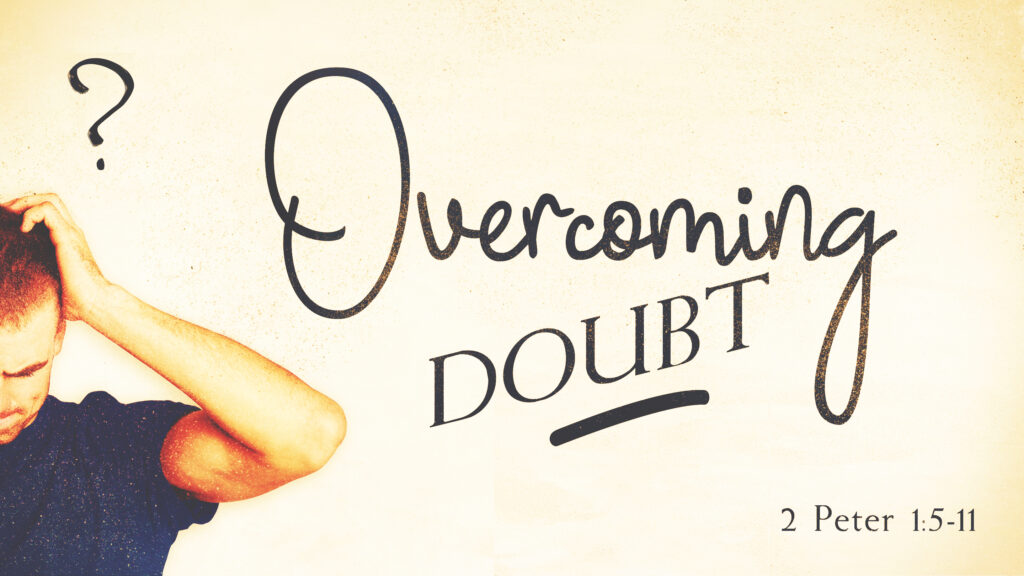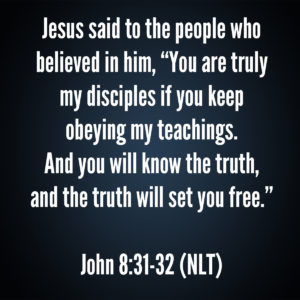Do You Struggle With Doubt & Unbelief? (Part 2)

I opened the first article about dealing with doubt by saying that doubts are a part of life, even when we come to faith in Christ. There are “Road Blocks” to faith that happen to all of us, even strong believers, because we have imperfect sight and information. One of the main reasons we are encouraged to read scripture regularly is because all scripture is like a chain link fence of interconnected verses, stories and principles. If we are missing verses, or even whole chapters, we get only a partial understanding. Then we can come to distorted perspectives of who God is and what he is trying to do in our lives. Faulty assumptions don’t just come from things that are untrue, but also can come form misapplied information or truth.
I mentioned that my cataract surgery was not what I expected because I only heard positive testimonies, and my own surgeon told me I would see without glasses 24-48 hours after surgery. When that didn’t happen, then I heard all kinds of stories of terrible experiences, including a neighbor who’s mother now has no vision in one eye and only 10 percent in the other. I believe that God heals people. I believe that when people pray miracles can happen. But let me also say that not all prayers are answered in the same way, and not everyone gets healed. That being said, I am praying for restored sight. And friends around the world are praying, even though my blurry vision has been going on for 5-6 weeks.
Remember the first story we dealt with of the father who had a demon-possessed son? He believed that his son would be delivered by Jesus’ disciples laying on their hands and praying. The problem is that the demons seemed to be stronger than the faith of the disciples. The disciples walked in too much unbelief and lack of faith. Jesus had to show up and reveal the problem to them.
Let’s unpack how unbelief works and how to overcome it. First, there is a principle in Proverbs 3 that reveals a certain roadblock to faith developing. Keep in mind that faith in its simplest form is trust in something or someone without complete sight or understanding.
Proverbs 3:5
Trust in the LORD with all your heart and do not lean on your own understanding.
As a former auto mechanic I was always taught that when approaching a problem start with the basic and work your way to the complex otherwise you will be chasing your tail and never find the problem. This verse states that our hearts need to be focused on God and not on ourselves, because God knows and has abilities far beyond ourselves.
Take the story of Peter and the eleven disciples being told by Jesus to get in a boat and go ahead of him to their next ministry location.The boat started to encounter a fierce storm around 3am. Jesus came to them walking on the water and the hardened fishermen were freaked out to say the least. Fear gripped their hearts even though they were tough men. When fear grips your heart you either confront it or doubt and unbelief take over.
Matthew 14:27-29
But Jesus spoke to them at once. “It’s all right,” he said. “I am here! Don’t be afraid.”Then Peter called to him, “Lord, if it’s really you, tell me to come to you by walking on water.” “All right, come,” Jesus said. So Peter went over the side of the boat and walked on the water toward Jesus.
Peter confronted his fear by asking what seems to be an impossibility. He had never walked on water before and to the best we can tell didn’t know anyone else who had except seeing and hearing Jesus. When fear starts to grab our thinking we have to call what makes us afraid out by upping the challenge. Peter did just that. He upped the the stakes of fear by asking to do the impossible. My friends are praying for better sight than I had when wearing glasses, which I have worn since I was 18 years old. They aren’t praying for my sight to get back to normal but for better sight.
But then Peter starts to look around at what he is doing and doubt starts to challenge his faith. As soon as he shifts his eyes from Jesus to the waves he has lost the battle, he just doesn’t know it yet.
Matthew 14:30-31
But when he looked around at the high waves, he was terrified and began to sink. “Save me, Lord!” he shouted. Instantly Jesus reached out his hand and grabbed him. “You don’t have much faith,” Jesus said. “Why did you doubt me?”
So the first problem is trusting what we know more than trusting what Jesus knows. The second problem is letting circumstances dictate what we believe. As long as Peter trusted Jesus he was advancing. When he lost sight of trusting someone greater than himself he started to fall. Let me state something that is very important. Peter didn’t deny that he was in a storm. He didn’t start speaking out that there were no waves. He trusted Jesus more in the beginning. We can’t deny problems or storms around us, but we also can’t embrace fear if we want Jesus to be our strength. Remember Hebrews 11 about what God expects.
Hebrews 11:6
So, you see, it is impossible to please God without faith. Anyone who wants to come to him must believe that there is a God and that he rewards those who sincerely seek him.
God is not trying to make having faith impossible, but he is expecting us to look to him for solutions rather than being terrorized by fear of failure or harm.
Let me leave you with this important detail. “Doubt and Unbelief” are different. Doubt is to question what you believe. Unbelief is to refuse to believe. Unbelief involves spiritual blindness and determined resistance to Jesus. God can work with our doubts but he can’t work with unbelief.
In the next article we will go deeper into how to believe Jesus more than your circumstances.
Questions:
1) Are you trusting yourself more or Jesus more? Remember this is a choice.
2) Are you struggling with doubt or unbelief? Doubts are ok but unbelief is a killer.
May we explore how our souls process both doubt and unbelief.
Pastor Dale




Leave a Comment